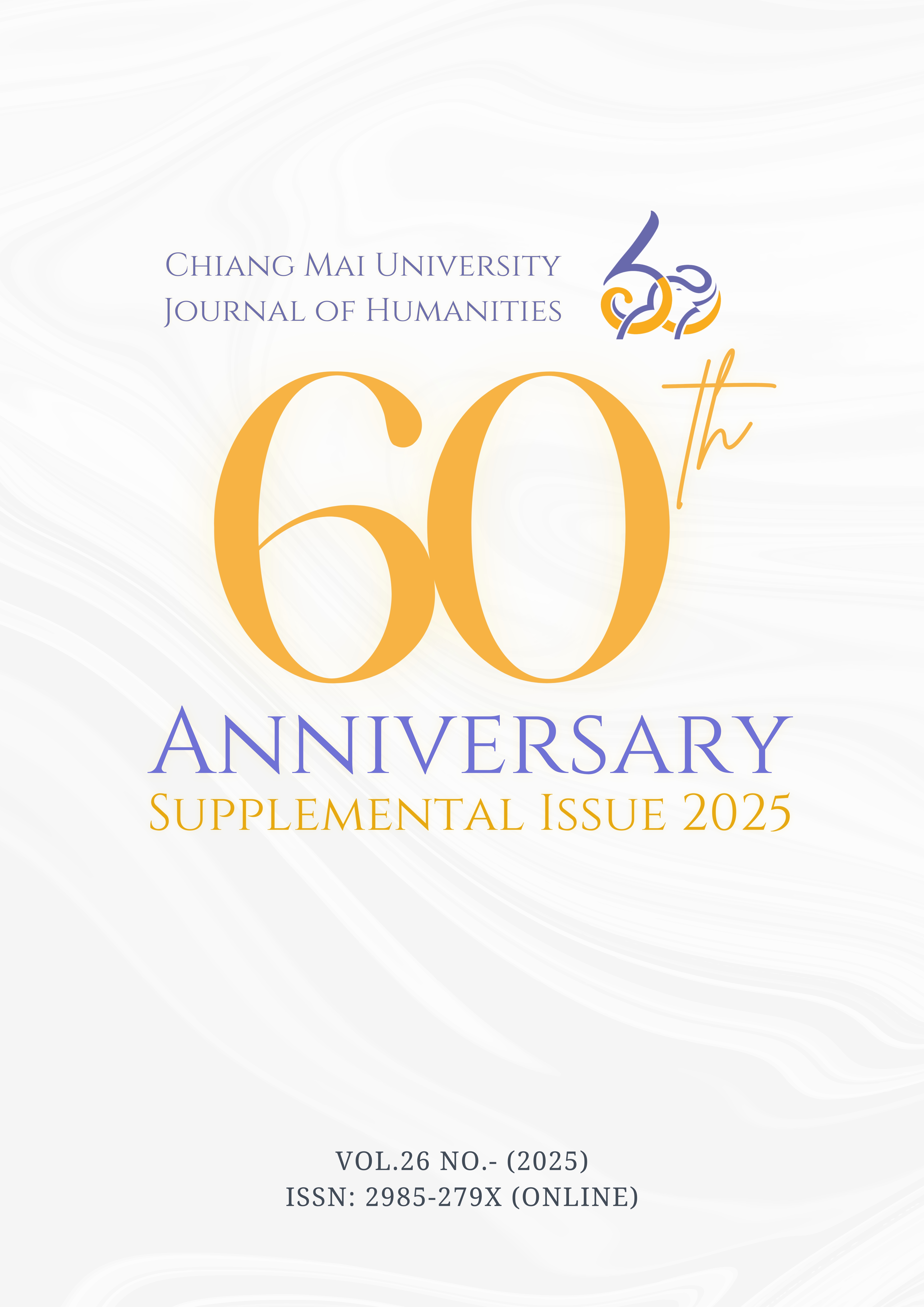Exploring the Representation of Male Homosexuals in Thai Boy Love Series through Critical Discourse Analysis
Main Article Content
บทคัดย่อ
This academic article presents the portrayal and impact of the Boy Love (BL) series within the Thai media landscape, and the social influence on the Thai Boy Love genre. The article explains the representation of Thai Boy Love series through referencing theoretical frameworks and concepts of Michel Foucault, Judith Butler, and Norman Fairclough, illustrating how they can be used in interpreting texts and visuals. Additionally, it discusses the role of media portrayal, audience engagement, and broader cultural impacts on the discourse surrounding the Thai Boy Love series. The reproduction of the sexual traits and roles of male homosexuals, which are argued to follow the binary gender norm in Thai Boy Love series, are also explained. Last but not least, the article elaborates power dynamics, ideological positions, and societal norms embedded in this genre, in hope that the genre of Thai Boy Love and the representation of male homosexuals are explained in a broader aspect, which may lead to a more creative adaptation and realistic portrayal of Thai homosexuals in the of the genre. Despite the insights gained, significant gaps are thought to remain in investigating local cultural and linguistic contexts in the Boy Love series, especially those relating to sexual performativity.
Article Details

อนุญาตภายใต้เงื่อนไข Creative Commons Attribution-NonCommercial-NoDerivatives 4.0 International License.
เอกสารอ้างอิง
Baudinette, T. (2019). Lovesick, The Series: Adapting Japanese 'Boys Love’ to Thailand and
the creation of a new genre of queer media. South East Asia Research, 27(2), 115-132.
Brown, G., & Yule, G. (1983). Discourse Analysis. Cambridge University Press.
Bunyavejchewin, P., Tungkeunkunt, K., Kamonpetch, P., Sirichuanjun, K., &
Sukthungthong, N. (2024). Socio-demographics, lifestyles, and consumption frequency of Thai ‘Boys Love’ series content: Initial evidence from Thailand. Cogent Social Sciences, 10(1). https://doi.org/10.1080/23311886.2024.2307697
Butler, J. (1990) Gender Trouble: Feminism and the Subversion of Identity. Routledge.
Butler, J (2004). Undoing Gender. Routledge.
Finlay, T. (2017). Non-binary performativity: A trans-positive account of Judith Butler’s
queer theory. Laurier Undergraduate Journal of the Arts, 4(1), 8.
Foucault, M. (1969/1972) The Archaeology of Knowledge. Tavistock.
Foucault, M. (1972) The discourse on language (L’ordre du discourse), The Archaeology of
Knowledge and The Discourse on Language. Pantheon Books, pp. 215–37.
Fairclough, N. (2013). Critical discourse analysis: The critical study of language (2nd ed.).
Routledge.
Fairclough, N. (2013). Language and power. Routledge.
Future (2023). MCOT and Rookie Thailand. Poster.
Gumperz, J. J. (1982). Discourse strategies. Cambridge University Press.
Habermas, J. (1985). The theory of communicative action, Vol. 1: Reason and the
rationalization of society (T. McCarthy, Trans.). Beacon Press.
Halliday, M.A.K., & Hasan, R. (1976). Cohesion in English. Routledge
Jirattikorn, A. (2023). Heterosexual Reading vs. Queering Thai Boys' Love Dramas among
Chinese and Filipino Audiences.
Kress, G. (2009). What is mode? In C. Jewitt (Ed.), Handbook of multimodal analysis
(pp. 54–66). Routled
Lacap, J. P. (2023). Yaoi media consumption and travel motivation: Evidence from Filipino
viewers of Thai boys’ love series. Advances in Southeast Asian Studies, 16(1),
-143.
Lizada, M. A. (2022). A new kind of 2Getherness: Screening Thai soft power in Thai boys
love (BL) Lakhon. In Streaming and screen culture in Asia-Pacific (pp. 125-143). Cham: Springer International Publishing.
One 31. (2020). “TharnType the Series Season 2”. Me Mine Y.
Pagliassotti, D. (2008). Reading boys’ love in the West. Particip@ tions, 5(2), 222-249.
Pham, A. T. (2019). The Thai perception of the bounds of masculinity: an analysis of boys’
love drama series.
Pham, A. T. (2021). What It Means to Love a Man: The Evolution of the Boys’ Love
Industry in Thailand. Southeast Asian Media Studies Journal, 3(2), 107-126.
Prasannam, N. (2019). The Yaoi Phenomenon in Thailand and Fan/Industry Interaction.
Plaridel, 16(2).
Sinclair, J. M., & Coulthard, R. M. (1975). Towards an analysis of discourse: The English
used by teachers and pupils. Oxford University Press.
Still2gether The Series (2020). GMMTV (EP 5).
Uy, C. E. C. (2021). Analyzing the Depictions of Queer Struggles in Selected Asian BL
Series. 249-283.
Van Dijk, T. A. (2009). Society and discourse: How social contexts influence text and talk.
Cambridge University Press.
Welker, J. (2006). Beautiful, borrowed, and bent:“Boys’ Love” as girls’ love in Shojo
manga. Signs: Journal of Women in Culture and Society, 31(3), 841-870.
Zhang, J. (2021). The Reception of Thai Boys Love Series in China: Consumption,
Imagination, and Friction.
Zsila, Á. (2017). The boys’ love phenomenon: A literature review. Journal of Popular
Romance Studies.
gether The Series (2020). GMMTV. (EP. 3, 4, 5).
กฤตพล สุธีภัทรกุล (2020). การประกอบสร้างตัวละครชายรักชายในซีรีส์วาย. Retrieved from:
https://repository.nida.ac.th/handle/662723737/5148.
จตุพล สุธีสถาพร. (2023). Soft Power ซีรีส์วายไทยทำไมถึงโด่งดังไปทั่วโลก. Retrieved from:
http:www.pacebar.th/business/thailand-soft-power-series-y-entertainment-tourism- economy
นัทธนัย ประสานนาม. (2023) อนาคตซีรีส์วายและอุตสาหกรรมวายไทย ผ่านมุมมอง รศ.ดร.นัทธนัย ประสานนาม.
Retrieved from: https://feedforfuture.co/feed-people/41125/
ปณต สิริจิตราภรณ์ (2022). ความรุนแรงบนฐานเพศสภาพในซีรีส์วาย. Chulalongkorn University Theses and
Dissertations (Chula ETD). 6332. https://digital.car.chula.ac.th/chulaetd/6332
ภูวเดช ดวงมณี, ปนันดา เลอเลิศยุติธรรม, และ นัทธนัย ประสานนาม. (2021). ภาพแทนชายรักชายในนวนิยายยาโออิใน
นวนิยายเรื่องรักนี้บังเอิญคือคุณ. วารสารมนุษยศาสตร์ และสังคมศาสตร์ มหาวิทยาลัยมหาสารคาม, 40(4), 70-82.
ภานนท์ คุ้มสุภา. (2022). การสร้างกรอบโครงความคิดเพื่อการเคลื่อนไหวทางสังคมในปริมณฑลซีรีส์วายไทย ปี 2563-2565.
วารสารสหวิทยาการ สังคมศาสตร์ และการสื่อสาร, 5(3), 137-147.
ธันวา ว่องนราธิวัฒน์ (2019). กระบวนการคัดเลือก พัฒนาบทบาทนักแสดง และการเพิ่มมูลค่าให้กับนักแสดงซีรีส์วาย.
Chulalongkorn University Theses and Dissertations (Chula ETD). 7087.


